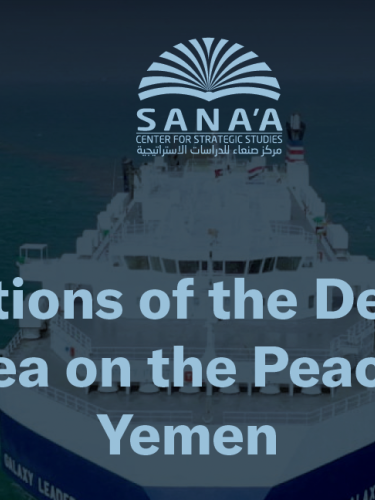
The Implications of the Developments in the Red Sea on the Peace Process in Yemen
13 February, 2024, Geneva, Switzerland
Recent tension in the Red Sea has disrupted regional stability and the supply chains linking Yemen to the global economy. Policymakers and peacebuilders seeking to respond to these new realities need an in-depth understanding of the complex dynamics of Yemen’s ongoing civil war, international maritime trade, and geopolitics of the Middle East. As part of our commitment to fostering an informed discussion on this matter, the Sana’a Center for Strategic Studies — in partnership with Columbia Law School and the Geneva Centre for Security Policy — is organizing a roundtable to discuss the ramifications of the latest escalation in the Red Sea and its implications for the peace process in Yemen.
SPEAKERS AND MODERATOR BIOS
Yasmeen Al-Eryani Sana’a Center Co-Executive Director for Knowledge Production and the former Director of Research (2023-2021). Al-Eryani oversees the strategic development of the Sana’a Center’s policy research and peacebuilding initiatives. She is an expert in PeaceTech, an emerging field which uses participatory approaches and information technology to facilitate peace processes. She previously worked with the United Nations Development Programme in Yemen. Al-Eryani is currently a Ph.D. candidate in Social Anthropology at Tampere University, Finland. She holds an M.A. in Political Science from the University of Helsinki and a B.A. in Government Studies from Georgetown University.
Sarah Boukhary Yemen Program Manager at the Centre for Humanitarian Dialogue (HD), a Swiss-based private diplomacy organization. She oversees the strategic development of the Centre’s contributions to the political process in Yemen, as well as its operational and programmatic priorities in the country. Sarah has been working on Yemen for more than nine years, and prior to joining HD, she worked for six years at the Women’s International League for Peace and Freedom (WILPF) where she managed its international advocacy work on Yemen, Syria, Iraq, Libya, Palestine, Lebanon and Egypt, and represented WILPF at the United Nations in Geneva. She primarily worked with women leaders and feminist activists to support their diverse roles in peace processes, inclusion in multiple tracks, and engagement with international human rights mechanisms.
Ahmed Eleiba Senior Program Officer, Swisspeace Mediation Program. Since 2017, Eleiba has supported peace mediation activities including interventions led by the United Nations, the European Union, and Switzerland. Thematically, he works on inclusion in peace processes, comparative approaches to mediation, and the technology-peace nexus. In the past, he supported Yemeni leaders through capacity building on mediation and negotiation.
Paul Dziatkowiec DETAILED ADDRESS Director of Mediation and Peace Support, Geneva Centre for Security Policy. Before this role Dziatkowiec served as Project Manager at the Centre for Humanitarian Dialogue (HD), an organization that mediates between protagonists in armed conflicts. In this capacity he contributed to mediation efforts in diverse conflict settings including Nigeria, Myanmar, Thailand, and most recently Ukraine. For five years Dziatkowiec also managed the Oslo Forum, a leading international mediation event that convenes peacemakers, heads of states, peace process actors, and conflict parties.
Register here:
